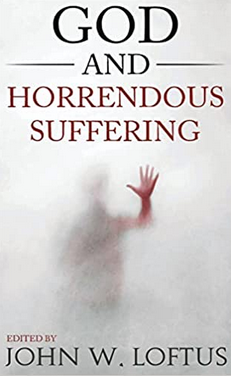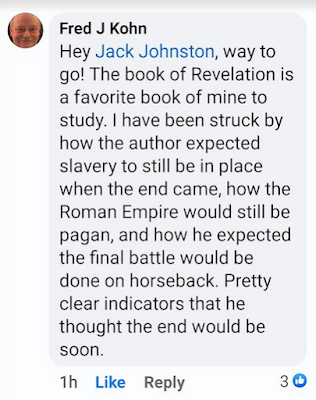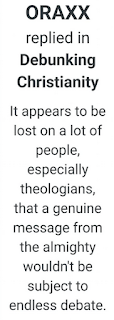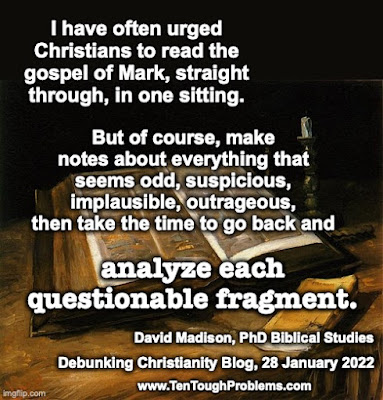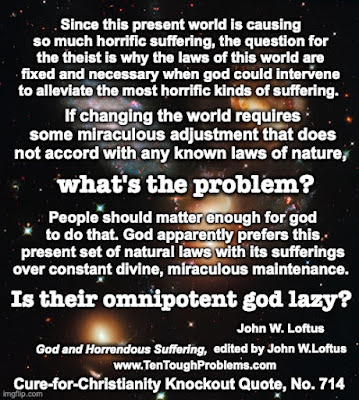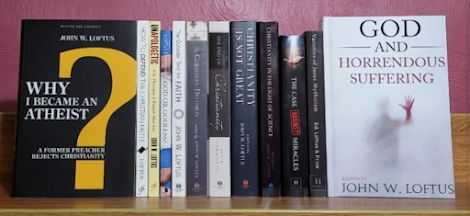March 10, 2022
Reassessing Paul's Timeline by Bart Willruth, Part 1
Paul, the so-called founder of Christianity, may not have been who we think he was, or lived when we think he lived. In this presentation, I will take some things for granted. I am writing from the perspective of a Christ mythicist; that is, there was no historical Jesus of Nazareth, and Christianity developed on different grounds. This has been argued elsewhere, therefore I will not repeat the arguments here; see "The Varieties of Jesus Mythicism" edited by John Loftus and Robert Price.
I realize that any attempt to date, or re-date, Paul will be speculative, but that process also includes the attempt to maintain the traditional timeline. But lack of proof doesn't preclude assessing probability. That which I will present in brief below is a novel paradigm; I would point out that the value of a paradigm rests in its utility in answering questions and drawing together a coherent explanation for the data. This is still a work in process.
I began this survey several years ago as I noticed anomalies and problems in the traditional view of Paul. That Paul was not writing in response to a historical Jesus is, by definition, a conclusion of virtually all of the Christ-myth theories. That the gospels and Acts are not historically reliable is a corollary to that position and is the conclusion of The Acts Seminar (WESTAR) and familiar names such as Robert Price, Richard Carrier, Earl Doherty R. G. Price, David Madison, and others; they cannot be used to tell us anything firm about Paul's biography or thought. All recognize the principle of giving primary sources (Paul’s own letters) absolute priority. Nevertheless, many of my fellow Christ-myth proponents continue to assume Paul's traditional timeline, that he was in some way converted to a form of Christianity in the 30's CE, that he began traveling throughout Greece and Asia Minor in the 40's CE to spread the word to the gentiles, and wrote letters to the believers in various cities during the 50's CE. But what are these dates based on? The answer is clearly the chronology of the gospels and Acts. But if there was no historical Jesus and Acts is theological/historical fiction, what ties us to these dates? We are effectively cut loose from those constraints except by habit and presupposition. In conversations I've had with other mythicists (most of whom are well known to the readers of John Loftus' books) the common responses to this problem are all variations of, “I agree that Acts is not reliable history, but it’s all we have,” or "These dates are overwhelmingly accepted by scholars. Why should we change them?" Of course, most of these scholars they reference are accepting some level of historicity for the Jesus of the gospels and Acts, so we end up in a circular defense chain with one major broken link. I still find some mythicists repeating some version of the phrase "within a few years of the crucifixion" or "the presumed date of the crucifixion." This imposes the later beliefs of Christian writers into the earlier writings of Paul as though he was writing in response to a historical Jesus which is a conclusion at odds with that of the Christ-myth theory. It is simply improper methodology to assume a chronology for Paul based on the later assignment of a date for a historicized Jesus and the immediate inauguration of the Christian movement. Bottom line: reassessing Paul's timeline is a direct and necessary consequence of deeming the Gospels and Acts as non-historical. Re-dating Paul would likely impact our understanding of his thoughts and purpose.
As an aside, Robert Price, in his book "The Amazing Colossal Apostle" suggests that Paul's letters date from the late first century CE to the second century CE. While we differ on where to assign a re-dating of Paul, we both recognize that there is no reason to hold to traditional dating. In his post, "How do we know the Apostle Paul Wrote His Epistles in the 50's AD", Richard Carrier acknowledges that "I don’t consider this matter as settled as mainstream scholars do. Paul’s Epistles do fit remarkably well the 50s B.C." However, he still wishes to maintain the traditional timeline.
Some other points to consider: According to the Acts Seminar, “Acts and Christian Beginnings”,
*Christianity did not begin in Jerusalem. It likely began in a Hellenized region.
*Acts was written in the second century.
*The author of Acts was writing a theological apologetic, not history.
*Acts cannot be considered a source for Paul’s biography.
*Acts must be considered non-historical unless proven otherwise.
I started questioning how we would assign a chronology to Paul without the gospels and Acts; that is, if we just discovered Paul's writings in a cave and didn't have the baggage of tradition and presuppositions about his timeline and the timeline of Christian origins, how would we date them? This question is so important that it should be repeated. Since we have no contemporary external data referring to Paul, we are essentially in that position of having just found his writings in a cave. Relying solely on internal clues, how would we assign a date of authorship to these writings. I began a survey of the boring details regularly skipped over by exegetes who are in a hurry to get to the theology; the people Paul mentioned, places mentioned, events, and terminology used, all in the attempt to find historical clues to tie him to a particular timeline. Very quickly, it became apparent that there is no historical marker referenced in Paul's writings which tie him to the traditional timeline, once the historical Jesus is removed from the equation. Yet, Paul does mention quite a few people, events, places, and terms which elicit questions vis a vis the traditional chronology as well as his identity and that of his addressees. After examining the clues available, it has become apparent to me that his timeline is defective and needs to be reassessed. At the same time, it would appear that his biography needs a second look.
March 07, 2022
March 05, 2022
Biblical Fideism and the Demise of Modern Christianity
March 04, 2022
“The age of Jesus was not an age of critical reflection…”
It has been my depressing experience, a couple of times in recent years, to attend services at Catholic churches. Once for a funeral, once for a wedding. On both occasions—one for grief, one for joy—the Mass was celebrated: the theatre, the spectacle, of magic. Here were citizens of the modern world: they survive and thrive because they have a pretty good grasp of the realities of life. They know what to do to raise families, acquire cars and houses, pursue careers, plan vacations, and build portfolios for retirement.
Their family entertainments commonly include Disney and superhero movies—and, of course, the Harry Potter adventures. These make-believe worlds are fun, because on-screen magic is fun. But why, in the world of church theatre, is the magic taken seriously? During both ceremonies I witnessed, members of the congregation approached the priest—in splendid theatrical costume—to receive a fragment of the body of their god: to eat their god. On some occasions they drink its blood as well.
February 27, 2022
Why Did Randal Rauser Recommend "God and Horrendous Suffering"?
As a Christian apologist, I can say that there is no intellectual objection to Christianity more daunting than the problem of horrendous suffering. In this important new book, John Loftus has gathered a diverse collection of voices that seek to build a comprehensive, multi-pronged critique of Christianity based on this most difficult problem. No Christian apologist can afford to ignore it.You can get this book from the Global Center for Religious Research. To read a nice summary introduction of the problem of horrendous suffering read this.
-- Dr. Randal Rauser, Professor of Historical Theology, Taylor Seminary, and co-author of God or Godless. Source.
It should be noted that despite his high recommendation of my work, Rauser is on a mission to discredit it, pejoratively calling me a "New Atheist" and a "Fundamentalist". He did a video about this where the only comment under it after 13 hours is, "This is stupid", by WCB. Hardy har har har!
February 26, 2022
February 25, 2022
God’s Inexcusable Negligence/Incompetence
It’s as if he isn’t all-powerful—or doesn’t exist
“…seven-year-old Adrian Jones was tortured repeatedly with some of the most inhumane practices, including being left standing overnight neck-deep in the family’s filthy swimming pool and being forced to exercise for hours without rest. In the end, he was confined to a shower stall where he was starved to death as he screamed through a vent, ‘I’m going to die.’ His torturers fed his corpse to pigs.”
This is one of several cases mentioned by Darren Slade in his essay, “Failed to Death: Misotheism and Childhood Torture,” in the John Loftus anthology, God and Horrendous Suffering. Slade explains that “failed to death” (FTD) “…originated from a 2012 investigative series by The Denver Post and 9News that examined the murder of 175 children in Colorado who were beaten, starved, suffocated, frozen, or burned to death.” (page 123)
February 22, 2022
Jesus Will Do Away With Democracy!
Perhaps in the comments someone can document what Fred Kohn wrote on Facebook. It needs some extended elaboration into other important areas, like theocracy and punishment.
Christianity is inherently theocratic, just like we find with the Hebrew religion in the Old Testament. It's wrapped in the language and culture of its day, which includes theocracy. The same language in Revelation says Jesus is expected to reign in a kingdom over people on earth, and later in heaven.
A reign over people assumes a theocracy. That was the political philosophy adopted in the Ancient Near Eastern world. The biblical god and his son are tied to a form of government that is rejected by modern, educated, civilized people. One cannot have a kingdom without doing away with democracy. So Jesus will do away with democracy! Christians still talk of a kingdom and a reigning Jesus. Heil Jesus! We also see this includes ancient forms of punishment that a king will inflict upon the disobedient. What could be problematic about this?
February 18, 2022
A Pop Quiz for Christians
There would be a lot of Cs, Ds & Fs
There are, of course, so many different kinds of Christians: from snake-handling cults in Appalachia (see Mark 16:17-18) to High-Church Anglicans who hold on to the resurrection as a metaphor—and thousands of varieties in between. James B. Twitchell put a humorous twist on it: “A Baptist is a Christian who learned how to wash; a Methodist is a Baptist who had learned to read; a Presbyterian is a Methodist who has gone to college; and an Episcopalian is a Presbyterian whose investments have turned out well.” (p. 31, Shopping for God: How Christianity Went from In Your Heart to In Your Face, 2007) Based on my own experience as a pastor, I know Christians exist on a scale, from lukewarm occasional churchgoers to those who are committed enthusiasts—they mean it when they tell us they “belong to Jesus."
February 15, 2022
The Case Against Miracles
I thought I knew a lot on these topics—inasmuch as I was once a born-again Christian myself and made these arguments, then became a born-again Skeptic debating believers—but I learned more from reading this one book than all other works combined. The Case against Miracles belongs in every library and personal bookcase of both believers and skeptics. LINK
--From the Foreword by Michael Shermer, publisher of Skeptic magazine.
February 14, 2022
Let's Debate The Real Issues!
Is it reasonable to believe in miracles based solely on 2nd 3rd 4th handed testimony?
Is it reasonable to believe in a good god given horrendous suffering?
The End of Christianity
“No collection better demonstrates how taking Christianity seriously reveals its all too human origin. This superb, often witty, and exceedingly well-researched collection explains how early Christianity is only a pale resemblance of any of the diverse Christian sects today. As well, the authors reveal how vastly improbable Christian dogmas are, such as the notion that a god designed the universe; that life replete with personal identity continues after death; that hell represents divine justice; and the claim that morality is exclusively Christian. Overall, very sobering for Christians, and so wonderfully delightful for the rest of us.”—Malcolm Murray, PhD, associate professor of philosophy, University of Prince Edward Island; author of The Atheist’s Primer. LINK
February 13, 2022
The Christian Delusion: Why Faith Fails

"John Loftus and his distinguished colleagues have certainly produced one of the best and arguably the best critique of the Christian faith the world has ever known. Using sociological, biblical, scientific, historical, philosophical, theological and ethical criticisms, this book completely destroys Christianity. All but the most fanatical believers who read it should be moved to have profound doubts."
--Dr. Michael Martin, author of The Case Against Christianity and Atheism: A Philosophical Justification. LINK.
February 12, 2022
Jonathan McLatchie Exposed for Being Disengenuous
 | ||
| Albrecht is a Catholic apologist. | |
February 11, 2022
The Endless Invention of Excuses for God
But there is such a thing as going too far
It’s a good guess that the apostle Paul is partly to blame for the common belief that nature itself is proof of God. He wrote this in his letter to the Romans (1:20): “Ever since the creation of the world his eternal power and divine nature, invisible though they are, have been understood and seen through the things he has made.” So just look around you to see God’s stunning handiwork. One modern theologian, Barry Whitney, illustrates how theists can get swept up in this sentimental view of nature:
February 10, 2022
My Magnum Opus!
I give this book two thumbs way up. In addition to courageously sharing his personal story, Loftus applies his considerable training and expertise into developing a cumulative case against Christianity and for atheism. I cannot think of another book like it on the market. Loftus is clearly familiar with the work of evangelical apologists like Copan, Craig, Geisler, and Moreland, as his book is filled with references to their work and objections to their arguments. In fact, his book might best be described as a “counter-apologetics” textbook.
--Jeffery Jay Lowder. LINK.
February 04, 2022
Sound But Not Convincing?

A sound argument is a valid one in which all premises are true and the conclusion follows from them. What reasons are there to remain unconvinced of an acknowledged sound argument? Let's say as a believer you think there is a sound argument from the problem of horrendous suffering that a good, all-powerful god doesn't exist. Then what are your reasonable options?
The Absence of a Human Jesus
Untangling the mess of Christian origins
Once upon a time—way back when the overwhelming majority of people were illiterate—God decided that the best way to tell people about himself was to write a book. That is, so the theologians assure us, he inspired humans to write it for him. Dropping a book in an illiterate world? This doesn’t strike us as a good plan, and it went downhill. Once the book was finally finished, God neglected to find a way to prevent mistakes as the manuscripts were copied by hand for centuries: thousands of errors were made. Scholars still haven’t been able to figure out for sure the wording of the original manuscripts. And, for centuries, God couldn’t find a way to make the book available to the masses. Even after the printing press had been invented, religious leaders resisted having the Bible translated into the languages of the people. Even now, with billions of copies available, this holy book is a dud, by which I mean that most of the faithful don’t like to read it. Actually read it, take to heart the idea that God’s word is there for the taking. If they really believed that, we wouldn’t be able to stop them from reading it.
February 01, 2022
My Critiques of the Christian Faith are Evidence Based
January 28, 2022
The Talent of Bible Authors for Making Things Up
Theology was more important than history
It is commonly considered an act of piety to read the Bible cover-to-cover. But once undertaken, this effort sometimes undermines piety—as it did for Mark Twain: “It is not the things which I do not understand in the Bible which trouble me, but the things which I do understand.” Not that I would discourage anyone from reading the Bible, in fact quite the opposite, as I argued in an article here a few weeks ago. Just don’t read it, however. Look at every chapter as an occasion to sharpen critical thinking skills; ask the right questions, e.g., where did this text come from, what was the motivation of the author, does it embody good or bad theology? —but especially, does it really pass muster as “word of a god”? Every Bible chapter should be scrutinized.
January 25, 2022
What's Wrong with Bayes' Theorem?
January 21, 2022
Christian “Truth” in Shreds: Epic Takedown 6
Are you satisfied with an image of Jesus on a potato chip?
For a very long time, Christianity has depended on amateur and professional excuse-makers to keep it going. It makes claims about reality—that there is a good, all-powerful god keeping watch over everything—but even the most devout Christians don’t have to look far to see so much that disconfirms this belief. Hence excuses are needed to keep the faith, to protect Christianity from buckling and crumbling. Believers are desperate for excuses because there is so much emotional investment in believing.
The amateurs come up with excuses based on naïve concepts learned in Sunday school, e.g., a mother of two young children died suddenly because “god needed her in heaven”—or simply because god works in mysterious ways; the conclusion that god is absent cannot be seriously entertained. Of course, there are those who abandon the faith because they are appalled by such excuses.
January 16, 2022
The 2022 Debunking Christianity Challenge
In 2010 I started something I called The Debunking Christianity Challenge. I challenged believers to read one recommended book a month. At that time I only had two published books. You can see the other books I recommended that year HERE.
January 14, 2022
Christianity: Three Strikes and You’re OUT
The church has done such a good job idealizing and promoting Jesus that its rank and file members aren’t even aware of strikes one and two. They don’t study and probe. They rarely ask: where did our beliefs come from?
Strike One:



